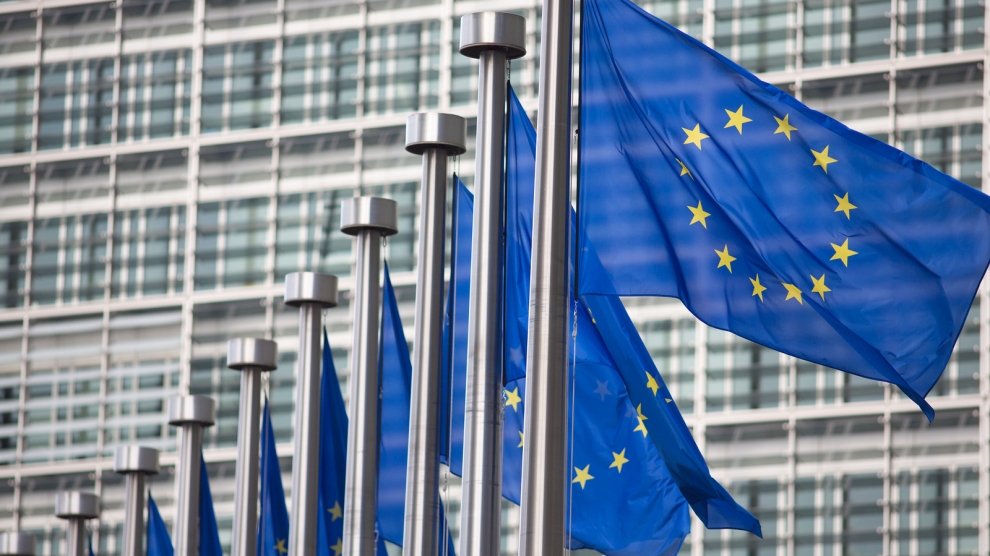The European Council has adopted its eighth sanctions package against Russia for its invasion of Ukraine, which expands its ban on the import of Russian steel products to include semi-finished steel, the European Commission said in a statement Oct. 6.
Among a number of other restrictions announced, the EC said it was banning the export of coal, including coking coal, which was used in Russian industrial plants, subject to a three-month wind-down period of existing contracts signed before the export ban was adopted.
The EU previously banned imports of finished steel from Russia as part of sanctions imposed in March, while some semi-finished and raw material suppliers had also been previously hit by sanctions imposed on specific companies and individuals.
The import ban would cover finished or semi-finished steel products that originated in Russia or had been exported from Russia, with a three-month wind-down period envisaged to allow for the execution of contracts signed before the import ban on the semi-finished steel products was adopted, the EC said in a Q&A on the sanctions package.
The EC, which said the new import restrictions totaled almost Eur7 billion ($6.9 billion) in value, added that the full ban on imports of some semi-finished steel products would be phased in after a transition period of up to two years.
It said the new package would also ban Russian steel products that had been further processed in third countries, within a one-year period.
Market sources told S&P Global Commodity Insights previously that European mill representatives had made an official request to impose sanctions on imports of semi-finished products from Russia after Russian President Vladimir Putin declared a partial military mobilization Sept. 21.
However, nine large companies, including European steel rerollers and traders, sent a joint letter to the EC Sept. 27 underlining the risk “of sanctioning input materials for the rerolling business model in Europe.”
According to the letter, any import ban on semi-finished steel products, such as slabs, billets and blooms from Russia would have consequences for the industry, such as unemployment and price spikes, as there were no other real options for substituting the supply with alternative producers.
More than 80% of the EU’s steel semi-finished steel products come from Russia and Ukraine, according to the letter.
European rerollers told S&P Global Oct. 6 that they were assessing the codes of the semi products that would be subject to the two-year transition period.
Platts, part of S&P Global, assessed the weekly FOB Black Sea slab price at $450/mt Oct. 5, falling 23.1% since the beginning of 2022. Russian slab and flat-rolled steel exporters mainly target the Turkish market, with their slab prices lower than the competition, according to S&P Global data.
Platts assessed import slab in Southern Europe at $600/mt CIF Italy Sept. 30, unchanged week on week, and plate in Southern Europe at Eur1,000/mt ex-works Italy Sept. 30, also flat.
NLMK
NLMK is the only slab exporter from Russia still active in the EU market despite global sanctions, and has been focused on slab delivered to its own coil and plate rolling mills in Belgium, France, Denmark and Italy and some external sales to Central European buyers.
In 2021, NLMK shipped 1.7 million mt to Dansteel, its plate mill in Denmark, and 670,000 mt of slab to NLMK Belgium Holdings, or NBH, a 49-51 joint venture between NLMK and Belgian investment fund SOGEPA, which comprises plate mills NLMK Clabecq in Belgium and NLMK Verona in Italy, and strip mills NLMK La Louviere in Belgium and NLMK Strasbourg in France.
In the first half of 2022, NLMK’s slab supplies to NBH totaled 1.33 million mt. Roughly 550,000 mt of slab was distributed among NLMK’s fully own subsidiaries outside of Russia, with some of this tonnage destined for Dansteel.
NLMK pointed out that during the transition period, the country is permitted to supply 3.7 million mt of slab between Oct. 7, 2022, and Sept. 30, 2023, and the same amount between October 2023 and September 2024, which is equivalent to the volume of exports in 2021.
For billets, imports into the EU from Russia can continue in the volume of 487,202 mt between Oct. 7, 2022, and Sept. 30, 2023, in the volume of 85,260 mt between Oct. 1, 2023 and the end of December 2023, and in the volume of 48,720 mt between Jan. 1, 2024, and the end of March 2024.
Severstal, the first Russian steel company to take the brunt of sanctions in early March, will not be further affected by the new sanctions.
Evraz, a significant steel billet exporter, told S&P Global Oct. 6 that it was not selling any steel products to the EU.
— Jacqueline Holman, Ekaterina Bouckley






